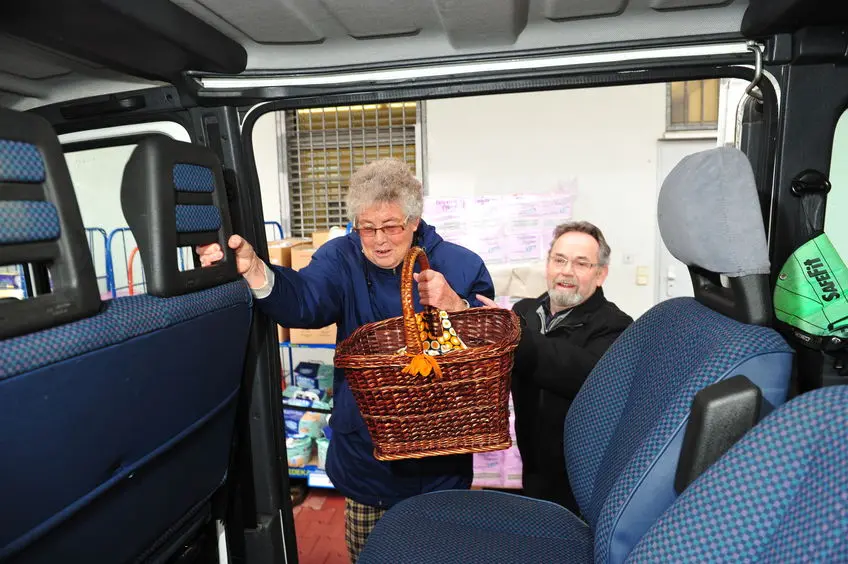The situation of paratransit users in Switzerland

At a glance
- Project leader : Prof. Dr. Brigitte Gantschnig
- Deputy of project leader : Selina Marita Egger
- Project team : Anna Baldissera, Philipp Egli, Dr. Martina Filippo, Prof. Dr. Armin Gemperli, Prof. Dr. Verena Klamroth-Marganska, Dr. Ronald Liechti
- Project status : ongoing
- Funding partner : Federal government (Eidgenössisches Büro für die Gleichstellung von Menschen mit Behinderungen EBGB), Foundation (Stiftung Behindertentransport Kanton Bern), Other (Pro Infirmis)
- Project partner : Stiftung Behindertentransport Kanton Bern, AGILE.CH Die Organisationen von Menschen mit Behinderung, Universität Luzern
- Contact person : Brigitte Gantschnig
Description
Description
Many people in Switzerland cannot use public transport or can only use it to a limited extent (e.g., due to a motor or visual impairment). They rely on paratransit services to participate in daily life. Various insurance providers, such as health insurance funds and the Swiss Disability Insurance and Old Age and Survivors' Insurance, provide some financial support by subsidizing travel. There are also foundations in some Swiss cantons that co-finance transport services. However, the responsibilities of these sponsors are often unclear. In addition, benefits may be tied to specific purposes and limited, for example, to a certain number of journeys per month.
Little is known about how people experience mobility limitations and how they affect their ability to work and engage in social activities. However, their views are relevant as Switzerland is obliged under the UN Convention on the Rights of Persons with Disabilities and the Swiss Disability Discrimination Act to facilitate the personal mobility of persons with disabilities.
Objective
The objectives of this research project were
- To provide an overview of national and cantonal regulations for paratransit services.
- To describe the limitations and disadvantages experienced by people with disabilities in this area.
- To develop recommendations for action for policy makers and those responsible in the relevant organizations.
Methods and procedure
The project team collected the views of persons with disabilities from different perspectives and using several methods:
- First, the experiences of 31 persons with disabilities were collected in five group discussions and analysed following the qualitative content analysis method.
- The findings of the qualitative study served as the basis for a large-scale quantitative survey in German-, French- and Italian-speaking Switzerland, in which 536 people participated.
- At the same time, the research team compiled an overview of the legal basis for paratransit services in Switzerland.
- Based on this overview and the results of the qualitative and quantitative data collection and the legal basis, the researchers developed recommendations for action and involved relevant stakeholders.
Results
In total, 594 individuals, both with and without disabilities, participated in the studies of the project. Among them, 336 (57%) were women, 256 (43%) were men, and two identified as another gender. The participants ranged in age from 18 to 103 years (mean=62.4, SD=19.6).
The results show that paratransit services are used for various purposes: for therapy and medical appointments, leisure activities, shopping, or commuting to work. These services are primarily used for short distances. Participants highly appreciate the personal care provided by the drivers, reliability, and safety of these services. The use of these services varies from person to person. While some can turn to alternative transportation services, paratransit services are the only option for others. As a result, high prices, unclear financing responsibilities, limited availability, and insufficient inter-cantonal coordination can be particularly limiting for these individuals. Overall, the legal framework for paratransit services is unclear, and the division of responsibility between the federal government and the cantons is not well-defined.
In summary, people with disability value paratransit services as crucial support for their daily activities and social participation. However, the basic rights of people with disabilities are affected, and the goals of the Convention on the Rights of Persons with Disabilities in the area of mobility are not being met. As a result, the following recommendations are proposed:
- Expanding the scope of the Federal Act on the Elimination of Discrimination against People with Disabilities (DDA) to cover paratransit services.
- Integrating paratransit services into public transport by subjecting them to the Passenger Transport Act.
- Ensuring nationwide coordination of paratransit services in terms of offerings, usage, booking, and payment.
You can find the complete results in the finale report "Gleichberechtigte Mobilität dank ÖV-ergänzender Fahrdienste? : eine Mixed-Method Studie über die Mobilität von Menschen mit Behinderung in der Schweiz" (see "Publications" below).
Further information
Publications
-
Egger, Selina Marita; Gantschnig, Brigitte; Filippo, Martina; Liechti, Ronald; Gemperli, Armin,
2024.
Journal of Transport & Health.
38(101856).
Available from: https://doi.org/10.1016/j.jth.2024.101856
-
Egger, Selina; Filippo, Martina; Liechti, Ronald; Gemperli, Armin; Gantschnig, Brigitte,
2024.
Handlungsoptionen für eine inklusive Mobilität [poster].
In:
6. Kongress der Ergotherapie, Fribourg, Schweiz, 24.-25. Mai 2024.
Winterthur:
ZHAW Zürcher Hochschule für Angewandte Wissenschaften.
Available from: https://doi.org/10.21256/zhaw-30946
-
Egger, Selina Marita; Filippo, Martina; Liechti, Ronald; Gemperli, Armin; Gantschnig, Brigitte,
2024.
Inklusion durch gleichberechtigte Mobilität für Menschen mit Behinderungen.
In:
6. Kongress der Ergotherapie, Fribourg, Schweiz, 24.-25. Mai 2024.
-
Gantschnig, Brigitte E.; Egger, Selina M.; Filippo, Martina; Liechti, Ronald; Gemperli, Armin,
2023.
Winterthur:
ZHAW Zürcher Hochschule für Angewandte Wissenschaften.
Available from: https://doi.org/10.21256/zhaw-2490
-
Egger, Selina Marita; Filippo, Martina; Liechti, Ronald; Gemperli, Armin; Gantschnig, Brigitte,
2023.
Gleichberechtigte Mobilität dank ÖV-ergänzender Fahrdienste?.
In:
Fachtagung für Dienstleistungsverantwortliche des Rotkreuz-Fahrdienstes aus den Kantonalverbänden, Olten, Schweiz, 25. Mai 2023.
-
Filippo, Martina; Egger, Selina Marita; Liechti, Ronald; Gemperli, Armin; Gantschnig, Brigitte,
2023.
Through transportation to participation : experiences in using paratransit services.
In:
16th Nordic Network on Disability Research Conference (NNDR), Reykjavik, Iceland, 10 - 12 May 2023.
-
Egger, Selina Marita; Gantschnig, Brigitte Elisabeth; Filippo, Martina,
2022.
Die Rechte von Menschen mit Behinderungen berücksichtigen.
Ergotherapie.
2022(8).
-
Egger, Selina Marita; Gemperli, Armin; Filippo, Martina; Liechti, Ronald; Gantschnig, Brigitte Elisabeth; et al.,
2022.
The experiences and needs of persons with disabilities in using paratransit services.
Disability and Health Journal.
15(4), pp. 101365.
Available from: https://doi.org/10.1016/j.dhjo.2022.101365